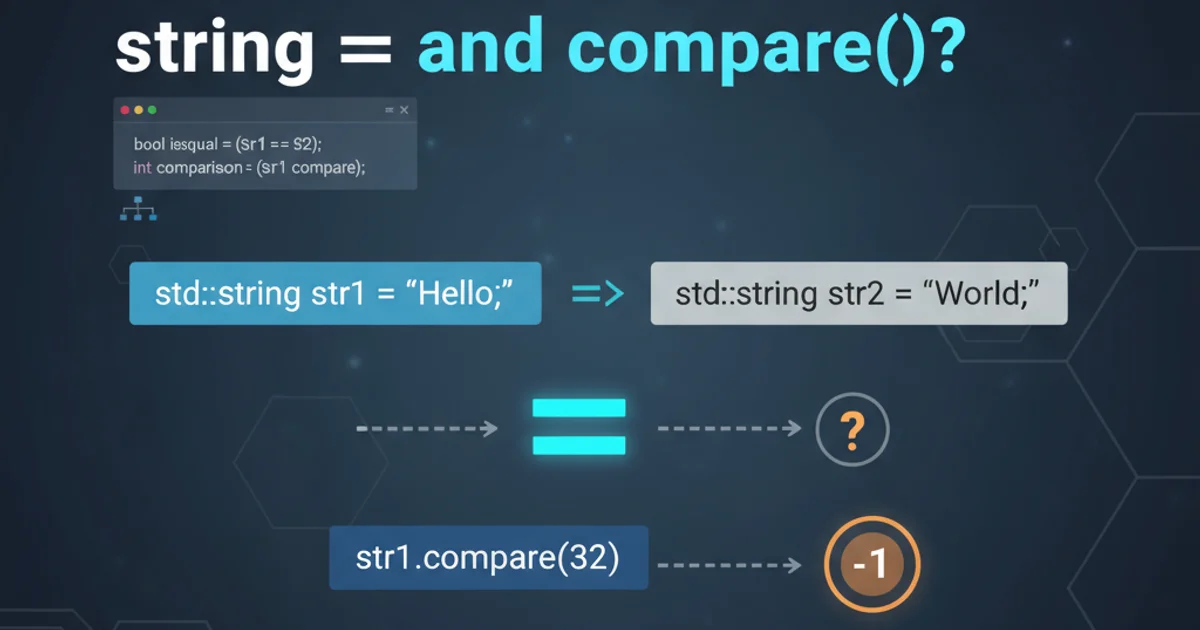Differences between C++ string == and compare()?
Categories:
C++ String Comparison: == Operator vs. compare() Method

Explore the nuances of comparing C++ strings using the == operator and the compare() method, understanding their functionality, performance implications, and when to choose each for robust string manipulation.
In C++, comparing strings is a fundamental operation, and the Standard Library provides two primary ways to achieve this: the == operator and the std::string::compare() method. While both can determine if two strings are identical, they offer different functionalities and have distinct use cases. Understanding these differences is crucial for writing efficient and correct C++ code, especially when dealing with lexicographical ordering or partial string comparisons.
The == Operator: Simple Equality Check
The == operator provides a straightforward way to check if two std::string objects are exactly identical. It performs a character-by-character comparison, returning true if both strings have the same length and the same sequence of characters, and false otherwise. This operator is overloaded for std::string, making it intuitive and easy to use for basic equality checks. It's generally the preferred method when you only need to know if two strings are an exact match.
#include <iostream>
#include <string>
int main() {
std::string s1 = "hello";
std::string s2 = "hello";
std::string s3 = "world";
if (s1 == s2) {
std::cout << "s1 and s2 are equal." << std::endl; // This will print
}
if (s1 == s3) {
std::cout << "s1 and s3 are equal." << std::endl;
} else {
std::cout << "s1 and s3 are not equal." << std::endl; // This will print
}
return 0;
}
Using the == operator for basic string equality.
== operator is generally more readable and often optimized by compilers, making it the idiomatic choice in C++.The compare() Method: Detailed Lexicographical Comparison
The std::string::compare() method offers a more powerful and versatile way to compare strings. Unlike the == operator, which only returns a boolean, compare() returns an integer value indicating the lexicographical relationship between the strings. This means it can tell you not only if strings are equal, but also which one comes 'before' or 'after' the other in dictionary order. It also provides overloads for comparing substrings, making it useful for more complex scenarios.
The compare() method returns:
0if the strings (or substrings) are equal.- A negative value if the first string (or substring) is lexicographically smaller than the second.
- A positive value if the first string (or substring) is lexicographically greater than the second.
#include <iostream>
#include <string>
int main() {
std::string s1 = "apple";
std::string s2 = "banana";
std::string s3 = "apple";
// Full string comparison
int result1 = s1.compare(s2);
if (result1 < 0) {
std::cout << "'" << s1 << "' comes before '" << s2 << "'" << std::endl; // This will print
} else if (result1 > 0) {
std::cout << "'" << s1 << "' comes after '" << s2 << "'" << std::endl;
} else {
std::cout << "'" << s1 << "' is equal to '" << s2 << "'" << std::endl;
}
int result2 = s1.compare(s3);
if (result2 == 0) {
std::cout << "'" << s1 << "' is equal to '" << s3 << "'" << std::endl; // This will print
}
// Substring comparison: s1.compare(pos1, len1, str2, pos2, len2)
std::string fullString = "programming";
std::string subString = "gram";
// Compare "gram" from fullString (starting at index 3, length 4) with subString
int result3 = fullString.compare(3, 4, subString);
if (result3 == 0) {
std::cout << "Substring '" << fullString.substr(3, 4) << "' is equal to '" << subString << "'" << std::endl; // This will print
}
return 0;
}
Using compare() for lexicographical and substring comparisons.
When to Use Which
The choice between == and compare() largely depends on your specific needs:
Use
==when:- You only need to check for exact equality between two entire strings.
- Readability is a high priority, as
==is more intuitive for equality. - You are sorting strings using standard library algorithms that expect a boolean comparison (e.g.,
std::sortwith defaultoperator<).
Use
compare()when:- You need to determine the lexicographical order of strings (i.e., which string comes first alphabetically).
- You need to compare only a portion (substring) of one or both strings.
- You are implementing custom sorting logic or algorithms that require a three-way comparison (less than, equal to, greater than).
- You are comparing a
std::stringwith a C-style string (const char*) and want to specify lengths or offsets for both.
flowchart TD
A[Start]
B{Need exact equality?}
C{Need lexicographical order or substring comparison?}
D[Use `==` operator]
E[Use `compare()` method]
A --> B
B -- Yes --> D
B -- No --> C
C -- Yes --> E
C -- No --> F[Re-evaluate comparison needs]
D --> G[End]
E --> G
F --> GDecision flow for choosing between == and compare().
compare() can also check for equality (by returning 0), using == for this specific purpose is generally considered better practice due to its clarity and potential for compiler optimizations.Performance Considerations
In most modern C++ compilers, the performance difference between == and compare() for full string equality checks is negligible. Compilers are highly optimized and will often generate similar machine code for both operations when used for simple equality. However, compare() offers more flexibility, which might come with a slight overhead if you're not utilizing its advanced features. For substring comparisons, compare() is the only direct and efficient option provided by std::string.
It's important to note that both methods perform character-by-character comparisons. The time complexity for comparing two strings of length N and M is typically O(min(N, M)) in the worst case (when strings are identical or differ only at the very end). If they differ early, the comparison stops sooner.